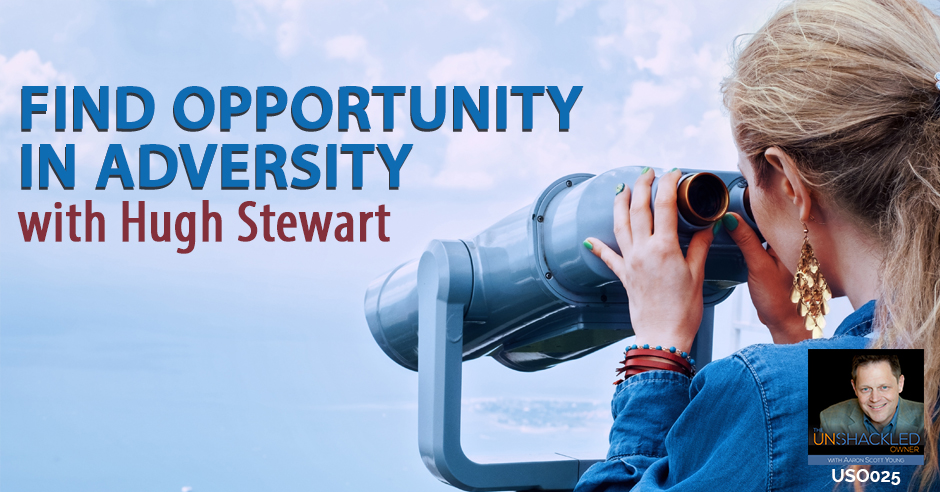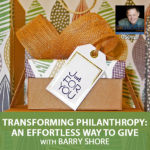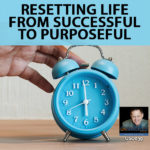
On this podcast, our intention, our goal, our mission is to help you to find interesting, creative ways to build your business, to create systems, to build processes, to build culture. All so you can be focused on what you’re great at and so that your business can run and grow and scale without having you become an indentured servant to that business. That’s what this whole idea of being unshackled is. Every podcast, I try to bring you fascinating people who are doing really interesting and maybe a little unorthodox things. Today’s guest is no different. His name is Hugh Stewart. I know you hear me say this often but full disclosure, Hugh Stewart and I are friends. We met at a very interesting, what I would even call a high level mastermind program down in Austin, Texas at a place called the Wizard Academy. It’s not Hogwarts. It’s not like that’s where Harry Potter is hanging out. Originally, it was going to be all around advertising and now, it expanded out. It’s a fascinating place with a very high level education all set in about a 15th century Spanish village that’s been built on 30 acres in Austin, Texas. Quite an interesting place.
The first time I went there, I met a whole bunch of fascinating people but the one person who I was just completely blown away by was Hugh Stewart. While I’ve made a lot of friends there, Hugh and I have been through a lot of interesting conversations and interesting life experiences in the four or five years that we’ve known each other. He’s doing some really cool things. I’m going to have him tell more of his story, but I want to say that he’s the founder of a really great software company and a product called Financial Co-pilot. Most of you are just going to think this is some kind of a Star Trek term or something. What Hugh does is he focuses on Multi-Dimensional Data Conversion Solution. If you’re in the accounting world, you’ll know what that means. Most of business owners, we tried to avoid anything technical. That’s why it’s great to have people like Hugh Stewart in our lives and available too.
Listen To The Episode Here
Find Opportunity In Adversity with Hugh Stewart
I’m really happy to have you here, Hugh. Thanks for coming on to the show.
Thank you very much, Aaron. I appreciate the kind introduction as always.
Hugh is a fascinating guy. How would you describe your body building stuff? What do you guys call it, CrossFit?
Yes. I’m a CrossFitter, going into my eighth year of CrossFit. It’s starting to work now. First three or four years, I wasn’t that great at it. Five or six years and I started to get competent and now it’s starting to work.
I don’t understand what that means. You’re getting good at it. When I met you years ago, you already looked like the Incredible Hulk. You’ve sent me little things of you, like 8,000 pounds on barbells. You’re just whooping up in the air, throw it down and then go have a latte or something. I don’t know what this means, “I’m kind of getting good at it.” There must be some special CrossFit magic. I thought it was just about being kickass huge.
No, not all. We won’t spend too much time talking about CrossFit because if you know anything about CrossFitters, they can talk about CrossFit for too long. That was probably year three and four for me. I’ve since stopped being an evangelist and now I’m a little bit calmer. What I’ll say is that CrossFit has thirteen different areas of fitness competency: calisthenics, gymnastics, met con or metabolic conditioning, strength, flexibility, mobility, gymnastics and a bunch of others. There are so many competencies that get thrown at you that you’ll never be great at everything. You’ll learn to be good at everything but never great at everything. There are always things for me to go learn. I still don’t know how to walk on my hands. I still don’t have pistols. I’ve maxed out on the strength area. I’m in the top 1% of power lifters in the world by volume, but I have terrible endurance, for instance. There are always things that you can be working on and I will be continuing to improve my skills hopefully for the rest of my life.
All of that sounds very much like entrepreneurial skills as well. We can’ be good at everything. We can be in the top 1% of what we’re awesome at, but that doesn’t mean we’re going to be great at everything in business. We’re going to be constantly a working progress which is really the thesis of the show. That was a fabulous introduction that we didn’t plan. I don’t want to go political at all but I do want to say there’s a lot of talk about illegal immigration. You’re a legal immigrant from a small country that most Americans only think of as a place to go on vacation. You started out as a kid and some interesting things happened in your favor, but then you really took advantage of the opportunities. Can you give us just real short idea of how you got to this country? What did you notice that was different than where you came from and why you thought that was a great opportunity?
I grew up in Jamaica, in a small place in the south called Saint Andrew. Jamaica is very close to Kingston. My father was recruited by an insurance company to this country. When I was growing up in school, you had to pay for your books. I remember having my parents always stressing about how much my school fees were every year in Jamaica, and then how many thousands of Jamaican dollars would have to be spent on buying supplies and books every single year that I went to school there. When I was a teenager and I came to this country, I remembered going to the public school system for the first time. When they handed out books to the school that I just went to and I don’t remember seeing my parents go into the office to pay the school fee, it was because it was a public school, which was a novel concept where you can have quality public school education.
They gave out books and I remember asking the teacher, “How much do I owe you for this?” She said, “They’re fine. Just take care of it and return at the end of the year and you get to use it.” I remember being so amazed that, “Holy crap. I can actually learn from this book. I don’t have to pay for it and all I have to do is to take care of it and return it at the end of the year. I get to use it, I get to learn from it.” I remember going home that day sitting down in my living room with my mother and taking newspapers and wrapping all the books so that way we were able to get through.

I can actually learn from this book. I don’t have to pay for it and all I have to do is to take care of it.
So that the cover stayed in good shape and so the book was going to be awesome when you send it back in?
Yes, that’s right. It was going to be in the same condition that I got it when I returned it at the end of the year. When I was a child we would wrap the books either in cardboard or in paper wrap or in newspapers so that it would preserve. It would be an extra cover for the cover.
This idea that you appreciated that there was this opportunity. I was one of these kids who was a horrible student. Because everything was just given to you, it’s just this is how it is. I should disregard this because, “If they’re just handing out, they’re just making me go to this building. I don’t really want to hang around in front of this teacher. Here’s another stupid book to carry.” Many people that I meet, have either a lackadaisical or a frustrated feeling towards the public education system. But you saw it as a giant opportunity that was just filled with “Oh, my gosh. I can’t believe they’re handing out this candy to me.” You got going as a student. The way I remember the story is you thought, “I better take advantage of this. I better appreciate it.” How was that demonstrated as you went through your academic career? Why don’t you tell us what degrees or what you studied? What did you with all those free books?
A few years before that, when I was still in Jamaica, this is the kind of environment I grew up in. I remember coming home with a Math test results and being afraid to show my mother. It was probably the fourth grade. She was standing in the kitchen at around 5:00 when I came home. She said, “Where is your Math result?” and I showed her the paper. She looked down at it and looked back at me a little bit disturbed and said, “What didn’t you understand?” The score was a 98%. That’s the kind of environment I grew up in.
When I got here to this country, getting anything less than an A was unacceptable. I graduated with perfect grades from middle school. I got three B’s in high school that I’m still a little sore about today. But everything else was A so I was able to graduate as a valedictorian of my high school and I was able to go on a full academic scholarship. The scholarship story is a whole other thing for another day. Talk about adversity becoming opportunity. Basically, I managed to get into University of Miami on a full scholarship, negotiated with the administration during my sophomore year to get into grad school and complete grad school and the undergraduate degree at the same time. In 2001, I graduated with a Master’s Degree in Mechanical Engineering in addition to a Bachelor’s in Math. I started my career in Wilmington, North Carolina as a nuclear fuel designer with GE. That’s how this all started.
Nuclear fuel designer. That’s not like, “I got an Art’s degree or I got a basic business degree.” He comes out as a nuclear fuel designer, master’s and bachelor’s at the same time and with awesome grades. The top of your class kind of graduate. You go to work for General Electric as this nuclear fuel designer. That was great but then your entrepreneurial tendency started to manifest itself right away, didn’t it?

Rich Dad, Poor Dad by Robert Kiyosaki totally disrupted all of my plans.
Yes. Just in my last semester of grad school, one of my mentors who I had no idea how rich he was, handed me a book called Rich Dad, Poor Dad by Robert Kiyosaki and it totally disrupted all of my plans. I was going to be an engineer for 30 years. It’s going to do the whole pension thing that was what my dad had done. This book opened my eyes to what was possible and just how groomed for mediocrity I was going through the education system with the expectation of getting a good job, staying in that job and then retiring at some other age with a 401(k) that was hopefully intact. My plans changed radically. I had a really good friend that took that trip with me initially to get excited about starting our own businesses. As soon as I started working for GE, I was looking around and I tried a bunch of stuff that just failed badly.
I got into private lending for instance. Most people started in real estate investing. I managed to hang out with a crew that started lending to real estate investors. When we couldn’t find enough people to lend money to, we took the money and started doing rehabs ourselves. Then we got into short sales. Then we got into insurance consulting and into retail financial services. Looking up ten years into the process, I had at one point up to ten business that I was operating at the same time. I had an incredible staff and team in each one of the businesses. Around the time that I met you, I had just sold most of the real estate that we had in Central North Carolina and we were on the way out from our retail financial services business where we had just exited. That was when we started writing books and started doing some other things.
When you talk about retail financial services, this was one of the stories I love. I was in business to business financial services as the vice president of a public company, the business though was barter. I never say barter because people don’t give that a very high esteem. I just say it’s business to business financial services. When you say that you’re in consumer financial services, you guys were cashing checks, is that right?
That’s right, check cashing, prepaid debit cards, wire transfers, faxing. It was really interesting. We had a chain of stores in Central North Carolina. When you say you’re a check casher, people don’t necessarily think that there is much there. Our niche allowed us to be able to do about $44 million a year in transactions a year. We were setting records for what we were able to do with the stores that we had in that little corner of the world, doing our thing, creating our process. That came with a lot of strain, struggle and it took as years, almost a decade to get to that place.
The thing that most of your folks would be able to appreciate is that the reason I personally got into that, we had bought it as an asset. We had a manager managing it but that manager ended up stealing $100,000 from us and almost drove us into bankruptcy because of it. Myself and my wife at that time had to jump in and get involved in the business and from a place of not knowing who to trust, molded it back in our image and actually grew the business five times over the six years that we were running it ourselves. We were in every single detail but we had to delegate. We had to give up responsibilities to people who we had to empower and trust. I learned what I had to do to create a culture in which people were respectful and honoring of the system that was being built. I also had to make myself a servant of their needs and their goals and be completely tuned in to their needs as we grew this culture. I realized, I was resonant with getting stolen from. That was a tough lesson to learn.
I went through situations like that years ago. Here’s a point about you that I’m so fascinated with. Here you are, this young kid who comes over from Jamaica as a young teenager. You excel in the school system so much so that you get your bachelor’s and master’s at the same time. You graduated 21 with a master’s degree going immediately to work for General Electric. Tell me again, what year was that?
Sixteen years ago, Hugh not only is working for General Electric but he’s starting to get into real estate, he’s doing lending and then pretty soon he gets this check cashing business that he doesn’t want to have. I shouldn’t say you don’t want to have it. It was an asset that you thought you are buying as a franchise or something. Somebody else was going to run it, you were going to do other things. Then you have to throw yourself in the middle of it but you took that and you turned it into a joggernaught that ended up becoming very financially successful. You sold it for millions and millions of dollars. All of these while you were on your twenties or early 30s, right?
Yes.
Age wasn’t a problem. Culture wasn’t a problem. Being an immigrant wasn’t a problem. Being a conventionally trained engineer wasn’t keeping you from being an entrepreneur. Many people have excuses, and the reason I love your story is it’s a story that is not without challenge. We’re telling the highlights of the positives right now. You took an opportunity that was placed before you that other people might have taken for granted and ran with it and then weren’t satisfied just with being a Master’s in Engineering. The fact that you had a great job with a big company at a young age, probably a good salary, good enough to get into doing real estate. You kept seeing opportunity, which you continue to do today. When you and I met, you had sold the financial business, the check cashing business. You had money. You were trying to figure out some other things to do. You’d started mentoring people. You were helping teaching some of these processes that you’d perfected in growing your companies to others. You got into some bumps there, but that didn’t matter even while going through bumps. Believe me, you know I’ve been through bumps. I’ve been watered up and stepped on and spit on and it was still okay. We just come back and we’re still worth as much or more than we were back then.
I did want to make a point. One comment I would make is that the adversity, it’s not just overcoming the adversity. The adversity in so many respects provides what gets to be the leap. I couldn’t apply for federal aid when I was a teenager trying to get to college because I didn’t have a green card. My green card process had been delayed by five years. I was in the Air Force Auxiliary. I was trying to go to the military. I wanted to go to the Air Force Academy. I couldn’t get in because not only wasn’t I a citizen, I wasn’t even a permanent resident of the country. My father and I went to the library and found scholarship books to go and apply for scholarships. I applied for 300 scholarships and I got 70 of them. It gave me enough money to go to school for free.
I’m a little perverse now because in a way I look for, “How is my butt going to get handed to me today?” Historically, in that adversity comes the very thing that I’m looking to do. The business that we’re doing today. The software business today, the one thing that I do that we’re quickly becoming the country’s best provider of this service for this one problem. If you don’t have this problem, you don’t care about what we’re talking about. But if you do have this problem, we become the only really great source to get it solved because we’re the only company currently that spends as much time and resources trying to solve this one problem.
I had that problem as a customer. I was a CFO for a real estate company and we were migrating between accounting platforms. The solution that the accounting software company that we were moving to, the solution they gave us was not good enough. After committing to the CEO that I would have the data in the system using this bad process in about two weeks, I realized that I was very wrong. I was very wrong to the point that it was going to cost an extra $47,000 and take another six months to make what I said was going to happen in two weeks. Think about you are in a partnership situation, you’re under the gun, you’re late in your reporting to your banks, you got to make this thing happen and you just find out that the solution that you were entertaining to happen in ten days is going to cost $47,000 and takes six more months. If you end up going that way, you’re probably going to be out of business. That’s the stuff of nightmares.
I basically asked for 24 hours to come up with a different solution. I wrote a piece of software that night that ended up being the first version of the utility that we use today for our business. Now, most of our revenue comes from serving customers all over the world that have that particular problem that we’re solving. It was born because I put my foot in my mouth. I didn’t mean to, but I got myself into a really big jam. In order to get myself out, it had to be technology innovation that was unprecedented. Now, it’s arguably the best business I’ve ever created because it has everything I ever wanted including the fact that I only have to dress up to go to work once a year. Yes, once a year.

Count your blessings when you have a challenge. You wouldn’t have it if you didn’t have the capacity to get through to the other side.
I have a worldwide team, a couple of people have moved but we’re in three different countries. Everybody is virtual. I haven’t met 97% of my customers. Most people just pay us by ACH or wire. We just basically do what we want when we want and show up and it works. It’s the highest margin business I have ever been involved in and it was born from the fact that I was in a jam. Every really great wonderful breakthrough that has ever happened in my life has come because of some intractable problem that conventional problem solving solutions just didn’t apply to. Count your blessings when you have a challenge because the Lord knows you wouldn’t have it in front of you if you didn’t have the capacity to make it exactly what you need to get through to the other side.
It’s such an inspiring story and a terrifying story as well. This idea of, 24 hours, I’ve got to do something tonight? I’ve got to stay up all night writing something? A lot of us have fears in our business. A lot of us wake up in the middle of the night nervous about what’s going to happen or did I do this thing or did I forget something or wringing our hands, woe is me. It’s the choice that you make in that late night, in that dark night. Do I just keep wringing my hands or do I stand up and dust myself off and go to work on solving the problem? Your Financial Co-pilot’s incredible success story came out of this. I can’t even believe, 24 hours you had to come back with a solution. “I’ll be back tomorrow.”
Financial Co-pilot was the brand that we were under. The MDCS, Multi-Dimensional Data Conversion Solution was born that night. The utility that governs that entire process, and it’s not just software. It’s an entire process for getting data from one accounting software to the other. We work for a particular ERP in the cloud that is the most amazing software I’ve ever seen for accounting. I’m a huge fan of theirs. I am really blessed that this solution has made us their primary contractor for handling all of their customers worldwide that have the particular problem that we had. They loved our solution so much that we did for ourselves that they engaged us to sell it to all of their customers in all of their channels.
It’s been the biggest blessing. You have to get to us by referral. You can reach us online and you can ask us to take a look at your situation. But unless you have somebody that you’re working with in your particular infrastructure and you are on your way showing that you’re going to have a successful implementation, you probably won’t get to us. It’s the best blessing ever. We’re prepared to talk about how we even got to that place because one of the things that’s really interesting is that when I started this particular business, I had to believe that there were other customers out there like me that wanted to have what I wanted in the system.
The company had been so bad about solving the problem that we had figured out how to solve that they convinced themselves that other people really didn’t need that solution. The prejudice that existed that, “What you guys do isn’t even really that possible and even if it were, no one would want it.” Having the gatekeepers start to think differently so that their customers who are like us could even be entertaining our solution, could even be informed that we existed to help them do what they wanted, was a huge, huge road block that took years to overcome.
Two big takeaways came out of what you just said, for me. One was instead of trying to be a generalist in your business, it’s really important when you identify a problem to, if possible, seek out those who have very, very niche, very specific solutions that are highly thought out, highly organized so that you can go fast in solving the problem instead of trying to do what it’s going to take you months and months to do at a great expense. By looking at things differently, you began to unravel the knot of the problem and within 24 hours you’d come up with at least the genesis of a process, which has now become a big success. But it became a big success inspite of or despite the pushback from the software company that you were creating the solution to work with in, right?
You’re absolutely right. The technical people were fans of the solution. It was the sales people who are the gatekeepers to all the other folks. They needed to be inspired that there was a different solution out there. We had to work for years showing them that, “No, you can give your customers what they want. We have solved this in such a way that you can now offer this and you can put us in their way. We will make sure that your customers are made happy, etc.”
The other thing that you just sparked in my brain, the best businesses that I have made in the last five years have all had a particular trajectory. That trajectory for me is it’s always easy and successful for me to start a business for which I’m the customer because then I don’t have to sell so hard. I’ve done these 34 businesses in the last 15 years is what I’ve started. Thank God, none have declared bankruptcy. But what I’ve learned from all of these is there are so many hard ways to start a business. This is just for me, this is not the way. This is a way that I find easy. I’m starting as the customer. Let me solve a problem for myself that I can get really intimately involved in, that I can figure out and then I can get to a solution that I really like. Then let me go find other people like me to tell my story to. If they like my story, they buy. It doesn’t matter the price. If they don’t like my story and they’re not congruent, then they won’t buy and you don’t have an issue.
I find that to be so much easier. Remember, I was an engineer so sales was an evil thing until I realized that I had to change the way I saw and thought about selling. Selling isn’t this car salesman approach where you’re trying to beat the customer into buying your thing. Selling for me at this point is understanding how much like you I am so that I can assemble all the things that I do to make your world a better place to live. I tell all my stories like that.
That’s exactly right. Selling done right is serving. It’s saying, “You have an illness, I have the medicine and let’s come together to solve the problem.” It shouldn’t be, “No, just trust me. This is really going to be good for you.” It should be something where you’re identifying a real solution. One of the things that you and your wife are doing for your young daughter is you have a belief that she needs to have a greater world experience. Do you want to just give us a minute and a half on what you guys are doing for that? Based on your life, coming from Jamaica, coming from one way of looking at the world, coming here, seeing a different way, exploiting that in a positive way. All these businesses that you’ve started that have solved problems for real people have given you quite a perspective on the planet. You guys are being proactive as parents.
My wife started learning multiple languages when she was a very young child. She went to a special school that focused on modern languages and she learned multiple. Today, she speaks four to five languages fluently and she’s working on six and seven and then she’s going back and reinforcing the ones she already knows. We had a similar desire for our child. The idea is if she’s twenty years old and applying to any university of her choice based on who she is and her credentials, who’s going to reject someone who’s lived in multiple countries and speaks multiple languages before the age of nineteen with the particular background that she has? We thought no one. The idea is how can we take advantage of her neuroplasticity prior to age six so that way we get her involved in multiple languages before the age of twelve.
She’s been taking multiple languages in her current school when she started at two and a half. Now that she’s five, she and my wife went to spend about seven weeks in Ecuador. They just got back and they’re going again on Thursday to spend another three months. She’s going to be enrolled in kindergarten down there. The idea is to hopefully have her be relatively fluent in Spanish by the time she gets back. After seven weeks, she was already speaking in broken Spanish sentences. By the end of the year, we’re expecting that she will have a lot more fluency. We have a number of languages on deck for her to go through and as long as it remains fun for her to engage, then we will continue the experiment. Otherwise, if at some point it becomes too militant or it’s just a little too fractured, then we’ll figure something else out.
Immersion in another language and another culture shifts your brain. It changes your brain. Things that you might think right now are too hard or I could never do that or whatever, when you get to another place and you, the human being, is sitting in a new context, all of a sudden opportunities that you thought were impossible may start to look more possible.
That was my story. When we sold the financial services business and a number of the real estate projects, I’d had enough of saying that I couldn’t speak Spanish well enough. I left the country by myself. I got myself an apartment in Medellin, Colombia. I enrolled in university there and I just went to school. I took all Right Brain courses, I took DETS, I took Languages and I took Photography for a few months until I got fluent in Spanish and then I came back to the States. That’s how I took care of that problem for myself, because I was just so sick and tired of telling the tune that I just didn’t have the confidence of speaking.
Who did you become in Colombia?

What are the influences that shaped my thoughts and thinking in those respected languages?
I didn’t realized it but because I didn’t have access to all of my thoughts and ideas in English, the person that emerges in Spanish has a different focus. He has a different way of looking at the world. He speaks less, he laughs more. It was really interesting learning about who I was in another language. Now I’m excited because I’m interested, “Who am I in Japanese?” I take Japanese every day and I’m taking Portuguese right now as well. I want to know who I am in Portuguese. What are the things that I gravitate towards? What are the influences that shaped my thoughts and thinking in those respected languages? I speak Patois, which is a dialect from Jamaica. It’s very similar to English but it has Twi influences. What we see there is there are things you can say and Patois that do not translate into English. Some of those meanings, those values in those sentences, that’s really something that I’m very passionately intrigued by. How do you express things that you don’t even know that you can feel because you’ve never heard those words, you never had the feelings to have the words express them? That’s something that I’m interested in.
I think that is so freaking fascinating. Let’s go through a few quick questions. First of all, do you have a favorite book? I know you talked about Rich Dad, Poor Dad but is there a book that you would recommend the business owners or people who wanted to get into business. What’s a book you would recommend that you’ve read?
I got two. For this particular question, I’m a fan of Rich Christiansen. The Zigzag Principle from Rich is a really good book. If I were looking to start a business today, that was outside of the way I make businesses. I like to start businesses by being the customer first. But if that’s not going to work for you or you need to move faster than that, I read his book and I said, “Wow, if I had this when I was 21, everything would have been different.” Noah St. John also writes a good book called The Secret Code of Success. That one trains you on how to ask really powerful, amazing questions and to surround yourself with a psychology of success. A lot of times, success in business is just about lasting. Just not giving up and everything in your world is going to want you to give up. You’re going to get so many messages that you just need to stop and go get a job and get realistic and the secret to the success really is not. How do you program yourself so that you are mentally tough? As long as you draw breath, you can take the next step.
I’ve had a lot of people tell me books over the years and it’s funny that today, you named two books by guys I know both of the authors. I appreciate that very much. I didn’t know you were going to go there. That’s awesome. How about a quote? Do you have a quote that you love that you live by?
There is a prayer I learned while I was in the Southeast Region Drill team as a cadet for the Air Force. It used to go like this, “We, the willing, led by the unknown, have done so much with so little for so long that we are now capable of doing anything with nothing.” I was fourteen when I learned that.
That is a powerful message. I’m so glad that you did that. I think that’s something to put up on our walls. Thank you for that, Hugh. You always know exactly the right thing to say. You’ve had ups and downs and challenges and I know we are the result of our life experience. If we love where we are now, of course we don’t want to change anything. But as a cautionary tale, something to help people avoid other pitfalls by learning from our experience, what would you go back and do differently if you could?
Your preface is more important to me than you know. One of the things that I have had to become very careful about is if you curse the past, you curse the path you’re on now. I don’t like to think about going back and changing things. If I had to do something over today with what I know now, the difference would be that I would have more faith in myself. I spent twelve years believing that I couldn’t sell. As a result, I would make partnerships or hire sales people because I didn’t believe I could sell. I gave up hundreds of thousands of dollars and I took much less than I should have on many deals because I had this longstanding belief that I wasn’t that guy. I was always the guy behind the scenes. This business has taught me that sales is a skill. It’s actually a skill that’s about being congruent with who you are. If you can tell a story about something you care about, you can be an amazing sales persons. If I had believed that ten years ago, I would be ten times richer.
It’s super helpful. Thanks for being transparent like that and open about that. Folks, go back and listen to the interview I did with a guy named Chris Smith who’s all about story and without becoming an expert in commercial real estate became the top producer in commercial real estate all because he figured out how to tell a good story. There are so many gurus out there right now, so many experts that are trying to say, “Let me help you tell your story.” It’s very vogue right now, but you learned it a long time ago and you did it against what is typical for someone who would be drawn to being an engineer. The fact is stories sell, real solutions sell. You don’t have to push. People will beat a path to your door, as the old saying says, if you can build a better mouse trap. Build a business, Hugh likes to start as the customer, and solve a problem that exists.
Hugh, wouldn’t you say a lot of people think they want to go into a certain business but nobody has really told them that anybody wants that business? Nobody really wants that product. Nobody really wants that service. They do beat their head against the wall and a lot of businesses fail because of a lack of market research or a lack of demand for the thing that they want to offer. I think you’re right, if somebody who’s deeply involved in business like you already were. You were already using that software that you needed to make work a certain way. Because you had deep, intimate involvement and you had deep need and you came with a solution that didn’t already exist, the odds are that in this big world of seven billion people, somebody else needs it.
I’ll make a statement about what you said. A lot of times, people will choose things to focus on that they think are cool. They don’t solve problems that are bothering them. You solve a problem that is ticking you off every single day or that has you running scared, there’s somebody else out there that can benefit from your solution. A lot of times, we focus on trying to do things that sound cool. No. Solve problems. Solve real hard, tough, annoying, dirty, nasty, grueling, unpopular and unsexy problems and you will get paid.
That’s exactly right. Hugh, if somebody wants to reach out to you or learn more about you or learn more about your services, about your financial solutions, how can they reach you? And do you have any parting wisdom for people as we close up this episode?
If you want to get through to us, our website is FinancialCopilot.com. Our telephone number is 910-221-4567. Parting wisdom, as long as you can draw breath, just take the next step. There is one other thing, and that is with respect to delegation. A lot of times, people don’t have a sense of trust. In three occasions, we had to start businesses again where we were on our backs, credit was wrecked, people had stolen from us, whatever. Trust was a big deal and so delegation is really not possible without trust.
What I want to tell you is this, if you are trying to solve a problem, break it down into steps. If you can break that into steps, then what you have isn’t just a business that solves a problem, it’s a business that has steps that become processes. You can teach people individual processes so you can begin to delegate a process at a time. Eventually, all your processes belong to other people and they can take them and improve them and make them better and be better than you ever could be. But the biggest obstacle to delegation is the fact that you have not discretized the problem that’s in front of you enough to where you can chip off little pieces and give it to other people to do and become masters of.
It’s phenomenal advice. That’s what we talk about. That’s what the Unshackled Owner course is all about, The Unshackled Owner Intensive. That’s for business owners that really are in business and who need to scale, who want to grow or have become a slave to their business. That’s exactly what we teach in that class. If you want to learn more about that, you can write to me directly, Aaron@AaronScottYoung.com.
Hugh, thanks for being with us today. Thanks for being here on The Unshackled Owner podcast. I love talking to you and I know our listeners have really earned some great stories. Always, everything you do, there’s not a lot of fluff. You go right to the heart of the matter. It’s what I’ve always appreciated about you and it’s why I knew I had to get you on here for these folks to learn from. Guys, you’ll be able to reach out to him, go to FinancialCopilot.com. If you want to talk him about overcoming adversity, about solving financial problems or about how to hit all the levels of CrossFit, he’s your guy. That’s it today on The Unshackled Owner podcast. We’ll see you guys again next week. Thanks for being here.
Links Mentioned
- Financial Co-pilot
- Multi-Dimensional Data Conversion Solution
- Rich Dad, Poor Dad
- The Zigzag Principle
- The Secret Code of Success
- AaronScottYoung.com
- The Unshackled Owner Twitter
- The Unshackled Owner Facebook
- Aaron Scott Young LinkedIn



